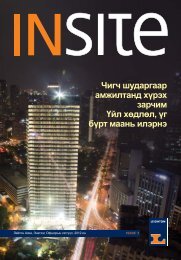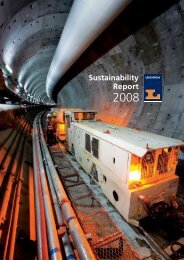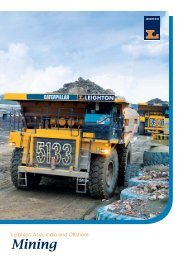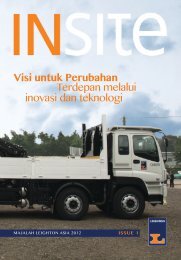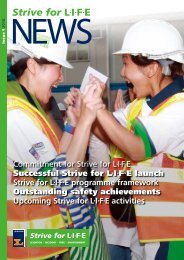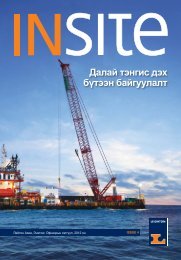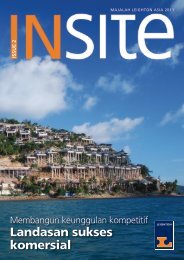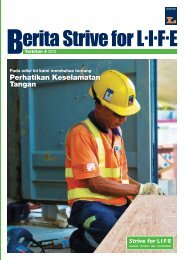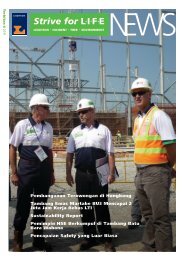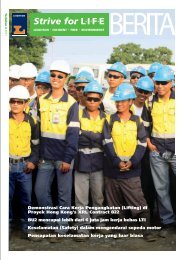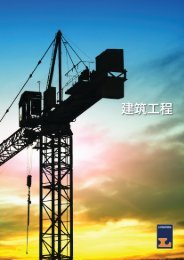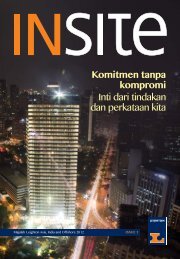Code of Business Conduct - Leighton Asia
Code of Business Conduct - Leighton Asia
Code of Business Conduct - Leighton Asia
Create successful ePaper yourself
Turn your PDF publications into a flip-book with our unique Google optimized e-Paper software.
<strong>Code</strong> <strong>of</strong> <strong>Business</strong> <strong>Conduct</strong><strong>Leighton</strong> Group <strong>Code</strong> <strong>of</strong> Ethics .................................................................. 3LAIO’s Core Values .................................................................................... 41.0 About this <strong>Code</strong> .......................................................................................... 51.1. Ethics and Compliance Framework ................................................. 51.2. About this <strong>Code</strong> ............................................................................... 81.3. Raising a <strong>Business</strong> <strong>Conduct</strong> Concern ........................................... 122.0 People and Safety .................................................................................... 152.1. Health and Safety .......................................................................... 152.2. Working with One Another ............................................................ 172.3. Personal Information and Privacy .................................................. 193.0 The Environment and the Community ....................................................... 203.1. Respect the Environment .............................................................. 203.2. Recognise the needs <strong>of</strong> the community ......................................... 213.3. Sponsorships and charitable donations ......................................... 224.0 Ethical <strong>Business</strong> Practices ........................................................................ 234.1. Bribery and Corruption .................................................................. 234.2. Gifts and hospitality ....................................................................... 254.3. Working with subcontractors and other third parties ...................... 274.4. Conflicts <strong>of</strong> interest ........................................................................ 294.5. Insider trading ............................................................................... 31<strong>Leighton</strong> GGS – Securities Trading Policy ................................................ 324.6. Anti-competitive <strong>Conduct</strong> .............................................................. 334.7. International trade controls ............................................................ 365.0 Use <strong>of</strong> LAIO Assets and Resources.......................................................... 385.1. Protection <strong>of</strong> assets <strong>of</strong> LAIO .......................................................... 385.2. Accuracy <strong>of</strong> reporting and disclosure ............................................. 405.3. Use <strong>of</strong> information and communications technology ...................... 416.0 Government, Media and Investors ............................................................ 426.1. Working with Governments ........................................................... 426.2. Political contributions and activities ............................................... 436.3. Public disclosures on behalf <strong>of</strong> the <strong>Leighton</strong> Group ....................... 45Glossary ................................................................................................................. 46<strong>Leighton</strong> <strong>Asia</strong>, India and Offshore Revision 430 November 2014 Page 2 <strong>of</strong> 46
<strong>Code</strong> <strong>of</strong> <strong>Business</strong> <strong>Conduct</strong><strong>Leighton</strong> Group<strong>Code</strong> <strong>of</strong> EthicsThe <strong>Leighton</strong> Group is made up <strong>of</strong> men and women working within <strong>Leighton</strong>Holdings Limited (“LHL”) and its 100% owned subsidiaries (“Group OperatingCompanies”) which comprise:• John Holland Group• <strong>Leighton</strong> <strong>Asia</strong>, India and Offshore• <strong>Leighton</strong> Contractors• <strong>Leighton</strong> Properties• ThiessThe purpose <strong>of</strong> each Group Operating Company is to build and maintain asustainable business that meets the needs <strong>of</strong> our stakeholders, including winningand undertaking pr<strong>of</strong>itable work.The Group’s core values are:• Discipline• Integrity• Safety• SuccessThe Group’s obligations are to:• Provide a safe and healthy workplace• Act with honesty, integrity and fairness• Respect the environment• Respect the needs <strong>of</strong> the communities in which we work• Be commercially competitive• Establish clear lines <strong>of</strong> accountability• Create a fun, challenging and performance driven culture• Encourage and support innovation and technological leadershipThe Group’s employees’ obligations are to:• Respect and look after each other, the people around you and the communityand environment we work in• Act with honesty, integrity and fairness• Work together – hard, smart and in the long term interests <strong>of</strong> the <strong>Leighton</strong> Group• Speak to your employer whenever something really seems to be wrong• Share your ideas for improvements• Assume personal responsibility and accountability for your work<strong>Leighton</strong> <strong>Asia</strong>, India and Offshore Revision 430 November 2014 Page 3 <strong>of</strong> 46
<strong>Code</strong> <strong>of</strong> <strong>Business</strong> <strong>Conduct</strong>LAIO’s Core ValuesOur core values form the foundation <strong>of</strong> our success.They unite the many countries and cultures we operate in and distinguish us fromour competitors.Our values are to:• Be commercially competitive• Provide a safe and healthy workplace• Act with integrity and fairness• Create a fun, challenging and performance driven culture• Protect the environment• Recognise the needs <strong>of</strong> the community• Encourage innovation and technological leadershipWe live our values through our behaviour. Our “Values House” helps guide us inhow we work with each other and our stakeholders.<strong>Leighton</strong> <strong>Asia</strong>, India and Offshore Revision 430 November 2014 Page 4 <strong>of</strong> 46
<strong>Code</strong> <strong>of</strong> <strong>Business</strong> <strong>Conduct</strong>1.0 About this <strong>Code</strong>1.1. Ethics and Compliance FrameworkLAIO has a strong commitment to undertaking its business with integrity –to do what is right and ethical.General PrinciplesWe expect LAIO Employees and business partners to always:• Act with honesty, integrity and fairness, in accordance with the <strong>Leighton</strong> Group<strong>Code</strong> <strong>of</strong> Ethics and our core values• Comply with the “<strong>Leighton</strong> Rules” which compriseo The <strong>Leighton</strong> Group Governance System (“<strong>Leighton</strong> GGS”)o All policies, procedures and standards implemented by LAIO for LAIOEmployees• Comply with all applicable laws wherever we operateWhere this <strong>Code</strong> contains higher standards <strong>of</strong> behaviour than local laws, rules,customs or norms, the higher standards in this <strong>Code</strong> will apply.Various terms in this <strong>Code</strong> are defined in the Glossary on page 49.<strong>Leighton</strong> <strong>Asia</strong>, India and Offshore Revision 430 November 2014 Page 5 <strong>of</strong> 46
<strong>Code</strong> <strong>of</strong> <strong>Business</strong> <strong>Conduct</strong>Three Fundamental ConceptsThe LAIO business conduct framework involves three basic concepts:PreventionThe most effective solution to ethics and compliance issues is to prevent thembefore they occur. This is achieved through a strong culture <strong>of</strong> ethical leadershipand equipping LAIO Employees with information, training and tools so theyunderstand what the potential risks are and what is acceptable behaviour. This<strong>Code</strong> is a cornerstone <strong>of</strong> our prevention efforts.Monitoring & DetectionLAIO has a monitoring and detection process to identify breaches <strong>of</strong> this <strong>Code</strong>, todetermine the causes <strong>of</strong> such breaches and to implement timely and appropriatecorrective action. This process includes a culture that encourages the reporting <strong>of</strong>suspected breaches <strong>of</strong> this <strong>Code</strong>. LAIO provides various channels to permit suchreporting, implements periodic risk assessments and compliance reviews, and has aquarterly reporting process.ResponseIf a suspected breach <strong>of</strong> this <strong>Code</strong> is reported, it will be investigated promptly and, ifsubstantiated, timely and appropriate action will be taken to address the particularissue and to prevent recurrences.Decision Making FrameworkThis <strong>Code</strong> provides a decision making framework by establishing the principles andvalues that guide actions and decisions. The aim is to promote an organisationalculture that enables LAIO Employees to respond appropriately to situations and beaccountable for their decisions.This <strong>Code</strong> cannot describe every situation, law or <strong>Leighton</strong> Rule that may apply toyou. This <strong>Code</strong> provides a framework but you are still required to exercise goodjudgement.Ethical Decision Making ModelStep 1 – Define the Issue• What is concerning about the situation?• Who else is involved and what is their perspective?• What effect does your behaviour have on the issue?Step 2 – Identify the underlying policies, principles and values• How do the policies <strong>of</strong> LAIO require you to behave?• If there is no relevant policy how does this <strong>Code</strong> require you to behave?• If this <strong>Code</strong> does not deal with the issue how do our values require you tobehave?<strong>Leighton</strong> <strong>Asia</strong>, India and Offshore Revision 430 November 2014 Page 6 <strong>of</strong> 46
<strong>Code</strong> <strong>of</strong> <strong>Business</strong> <strong>Conduct</strong>Step 3 – Consider your options• What are the alternative options in this situation?• For each <strong>of</strong> those options, do they conflict with any aspect <strong>of</strong> our policies,principles or values?• How might they affect LAIO and our stakeholders, and what are the potentialconsequences?• When you have reviewed your options, consider obtaining a second opinion froman independent, trusted personStep 4 – Make the right choiceYou need to be able to justify your actions and, in turn, be able to show that they areconsistent with our policies, principles and values.Not sure what to do?A quick decision making test is:• Do you have all the information that is significant to the decision you are about tomake?• Is it legal?• Does it comply with this <strong>Code</strong>?• What would your family, colleagues or manager say about the decision you areabout to make?• How would you feel if your decision was reported in the media?• Would you be confident explaining your actions to senior management orexternal authorities?• How would your behaviour be viewed in one or five years from now?• Would you be happy if you were treated this way?If your decision passes this test, and you feel confident about the choice you havemade, it is probably the right thing to do.If you are still in doubt, please raise your concern with your supervisor ormanager, or as otherwise outlined in this <strong>Code</strong>.<strong>Leighton</strong> <strong>Asia</strong>, India and Offshore Revision 430 November 2014 Page 7 <strong>of</strong> 46
<strong>Code</strong> <strong>of</strong> <strong>Business</strong> <strong>Conduct</strong>1.2. About this <strong>Code</strong>This <strong>Code</strong> represents the commitment by LAIO to uphold ethical businesspractices and meet or, where less stringent than our standards, exceedapplicable legal and other requirements. This <strong>Code</strong> is applicablethroughout LAIO, regardless <strong>of</strong> location or role.What does this <strong>Code</strong> cover?This <strong>Code</strong> outlines the standards <strong>of</strong> ethical business behaviour expected <strong>of</strong> LAIOEmployees.LAIO Employees are all people who work for LAIO as an employee, director, <strong>of</strong>ficeror people working under contract (where it is contractually required that they followthis <strong>Code</strong>).LAIO means the group <strong>of</strong> companies comprising the following businesses as set outin the organisational structure below:As a business, we are also subject to the laws <strong>of</strong> the locations in which we operate.Where this <strong>Code</strong> contains higher standards <strong>of</strong> behaviour than local laws, rules,customs or norms, this <strong>Code</strong> will apply.Who must follow this <strong>Code</strong>?This <strong>Code</strong> applies to all LAIO Employees (as defined above and in the Glossary onpage 49 <strong>of</strong> this <strong>Code</strong>).Responsibilities <strong>of</strong> those working for LAIOAll LAIO Employees must:• Comply with this <strong>Code</strong>, the <strong>Leighton</strong> Rules and the applicable laws that apply totheir work• Seek to ensure that others who represent LAIO, including business partners,comply with this <strong>Code</strong>, applicable laws and the <strong>Leighton</strong> Rules<strong>Leighton</strong> <strong>Asia</strong>, India and Offshore Revision 430 November 2014 Page 8 <strong>of</strong> 46
<strong>Code</strong> <strong>of</strong> <strong>Business</strong> <strong>Conduct</strong>The responsibilities <strong>of</strong> the <strong>Business</strong> <strong>Conduct</strong> Representative include:• Providing high-level guidance on the operation and applicability <strong>of</strong> this <strong>Code</strong>,including the standards <strong>of</strong> ethical behaviour expected under the <strong>Code</strong>• Dealing with business conduct concerns and breaches <strong>of</strong> the <strong>Code</strong>• Dealing with allegations <strong>of</strong> victimisation following a concern being raised• Reporting serious business conduct concerns to the Reportable <strong>Conduct</strong> Group(see following section), where appropriateReportable <strong>Conduct</strong> GroupLAIO has a Reportable <strong>Conduct</strong> Group (LAIO RCG) comprising LAIO ManagingDirector, LAIO Chief Financial Officer, LAIO General Manager People, Safety andEnvironment and LAIO General Manager, Risk & Governance, operating under acharter.The purpose <strong>of</strong> the LAIO RCG is to:• Address serious breaches <strong>of</strong> this <strong>Code</strong> which are referred to it, includingescalation through the relevant reporting hierarchy• Provide governance and oversight in relation to LAIO’s, ethics and complianceframeworkIts responsibilities include:• Monitoring the progress <strong>of</strong> investigations into serious breaches <strong>of</strong> this <strong>Code</strong>• Determining appropriate action where serious breaches are substantiated• Monitoring the implementation <strong>of</strong> such action, including referral to externalresponsible investigatory and enforcement authorities• Identifying enhancements or modifications to LAIO’s ethics and complianceframework, as appropriateQuestions about this <strong>Code</strong> or any particular behaviourIf you are unsure about the meaning <strong>of</strong> any part <strong>of</strong> this <strong>Code</strong>, or have any concernsabout how you should behave in a particular circumstance, you should:• Immediately raise this with your supervisor or manager, or• Where this is not possible (e.g. your concern involves your manager orsupervisor), speak with your manager once removed (i.e. your manager’smanager), or• Contact the LAIO <strong>Business</strong> <strong>Conduct</strong> Representative or his delegate, or<strong>Leighton</strong> <strong>Asia</strong>, India and Offshore Revision 430 November 2014 Page 10 <strong>of</strong> 46
<strong>Code</strong> <strong>of</strong> <strong>Business</strong> <strong>Conduct</strong>• Contact the <strong>Leighton</strong> Ethics LineVariation and review <strong>of</strong> this <strong>Code</strong>As this <strong>Code</strong> applies across the <strong>Leighton</strong> Group and forms part <strong>of</strong> the <strong>Leighton</strong>Group’s ethics and compliance framework any variations to this <strong>Code</strong> will either bedirected by LHL or will require LHL approval.The LAIO RCG is responsible for:• reviewing this <strong>Code</strong> at least annually and recommend necessary changes,including those to reflect changes in the law, to LHL for approval; and• amending this <strong>Code</strong> in accordance with any instructions from LHL.<strong>Leighton</strong> <strong>Asia</strong>, India and Offshore Revision 430 November 2014 Page 11 <strong>of</strong> 46
<strong>Code</strong> <strong>of</strong> <strong>Business</strong> <strong>Conduct</strong>1.3. Raising a <strong>Business</strong> <strong>Conduct</strong> ConcernRaising a business conduct concern ultimately helps and protects LAIO,our colleagues and our stakeholders. If you think a decision, or action, isnot consistent with this <strong>Code</strong>, the <strong>Leighton</strong> Rules or the law, you have aresponsibility, and an obligation, to raise that concern. All queries inrelation to this <strong>Code</strong>, and genuine concerns about breaches <strong>of</strong> this <strong>Code</strong>,will be treated seriously.Reporting potential, or actual, breaches <strong>of</strong> this <strong>Code</strong>If you are concerned about a suspected or an actual breach <strong>of</strong> this <strong>Code</strong>, youshould:• Immediately raise this with your supervisor or manager, or• Where this is not possible (e.g. your concern involves your manager orsupervisor), speak with your manager once removed (i.e. your manager’smanager), or• If you are not comfortable with the alternatives above, contact the LAIO <strong>Business</strong><strong>Conduct</strong> Representative, his delegate, or another member <strong>of</strong> the LAIO RCG, or• If you are not comfortable with the alternatives above, contact the independentlyoperated <strong>Leighton</strong> Ethics LineWhen raising a concern with the <strong>Leighton</strong> Ethics Line, ideally you should state:• Your name (you can choose to remain anonymous when raising a concern,however, it is easier to investigate concerns and provide follow-up if you identifyyourself)• What part <strong>of</strong> the business you work for• The nature <strong>of</strong> the issue• Who is involved• What steps you have taken, so far, to address the issue<strong>Leighton</strong> <strong>Asia</strong>, India and Offshore Revision 430 November 2014 Page 12 <strong>of</strong> 46
<strong>Code</strong> <strong>of</strong> <strong>Business</strong> <strong>Conduct</strong>Concerns in relation to human resources matters should be raised with yoursupervisor or manager, or their manager or the human resources manager for yourbusiness.You do not need to be directly affected by an issue in order to raise it – you canreport a concern that you have become aware <strong>of</strong> through your work.All issues raised should be on the basis <strong>of</strong> genuine concern. If anyone knowinglyprovides false information, makes false allegations, or raises concerns that aremischievous, or done with malicious intent, LAIO considers this to be a serious issueand disciplinary action up to, and including, termination <strong>of</strong> employment may betaken.Confidentiality is respectedWhen you raise a concern, your identity and the information you provide will beshared only on a ‘need-to-know’ basis in order to address the concern, as requiredby law, or otherwise, with your consent.You may choose to remain anonymous when raising a concern (in which case youshould advise this at the time you raise your concern). We will discuss with you howwe propose to make suitable arrangements to protect disclosure <strong>of</strong> your identity,subject to any disclosure required to investigate the concern or by law.Safeguarding against victimisationLAIO does not condone any form <strong>of</strong> punishment, disciplinary, or retaliatory beingtaken against anyone for raising or helping to address a genuinely held businessconduct concern. Victimisation is grounds for disciplinary action, includingtermination <strong>of</strong> employment.Should a LAIO Employee feel that they have been subjected to victimisation byLAIO following their raising <strong>of</strong> such a concern, they should contact the LAIO<strong>Business</strong> <strong>Conduct</strong> Representative, his delegate or another member <strong>of</strong> the LAIORCG, or the <strong>Leighton</strong> Ethics Line, and such concerns will be investigated.Obligations <strong>of</strong> those responding to concerns or questions about the <strong>Code</strong>Supervisors and managers responding to a business conduct concern must:• Treat all concerns seriously and, where requested in confidence unlessdisclosure is required for any investigation, or by law• Respond to issues raised in a prompt and pr<strong>of</strong>essional way (taking into accountthe <strong>Leighton</strong> Rules), provide accurate information and advice consistent with this<strong>Code</strong>, or seek the advice <strong>of</strong> experts with the right knowledge and objectivity• Raise any serious business conduct concern to the LAIO <strong>Business</strong> <strong>Conduct</strong>Representative, or his delegate or, if that is not appropriate, to the LAIO RCG.InvestigationsAll suspected, or actual, reported breaches <strong>of</strong> this <strong>Code</strong> will be investigated.<strong>Leighton</strong> <strong>Asia</strong>, India and Offshore Revision 430 November 2014 Page 13 <strong>of</strong> 46
<strong>Code</strong> <strong>of</strong> <strong>Business</strong> <strong>Conduct</strong>Breaches <strong>of</strong> this <strong>Code</strong> – disciplinary actionWhere, following investigation, LAIO is satisfied that a breach <strong>of</strong> this <strong>Code</strong> hasoccurred, disciplinary action may be taken. The nature <strong>of</strong> any action will depend onthe seriousness <strong>of</strong> the breach, and other relevant circumstances. Possibledisciplinary action may include one, or a combination, <strong>of</strong> the following:• A discussion with a manager and/or human resources person about desiredbehaviour• An oral or written warning• Counselling on misconduct• Transfer to a position with a lower level <strong>of</strong> responsibility• Adjustment <strong>of</strong> remuneration• Suspension• Termination <strong>of</strong> employment• Referral to external investigatory and enforcement authoritiesWhere a minor breach <strong>of</strong> the <strong>Code</strong> has occurred, the nature <strong>of</strong> any disciplinary orother action will be determined by relevant management, in consultation with otherappropriate sources <strong>of</strong> advice (for example, human resources and the LAIO<strong>Business</strong> <strong>Conduct</strong> Representative).ReferencesLHL Ethics and Compliance Committee Terms <strong>of</strong> Reference and ProceduresLAIO Reportable <strong>Conduct</strong> Group Charter<strong>Leighton</strong> <strong>Asia</strong>, India and Offshore Revision 430 November 2014 Page 14 <strong>of</strong> 46
<strong>Code</strong> <strong>of</strong> <strong>Business</strong> <strong>Conduct</strong>2.0 People and Safety2.1. Health and SafetyThis provision <strong>of</strong> a safe, secure and healthy working environment for allLAIO Employees and those under its care is vital.Our commitmentThe key safety objective for the <strong>Leighton</strong> Group is the elimination <strong>of</strong> fatalities andpermanent disabilities while systematically reducing all other injuries associated withthe working environment.The Group’s Health and Safety Policy issued by LHL provides the foundation forLHL and LAIO’s commitment to providing safe and healthy workplaces andcontinuously improving Health and Safety performance. This policy is supported bythe Group’s Health and Safety Standards issued by LHL which address thefundamental elements <strong>of</strong> achieving this commitment. This policy is furthersupported by LAIO’s Health and Safety Standards which outline the minimumrequirements for our business to achieve this commitment.The Group is committed to providing safe workplaces through:• Committed and active leadership• Effective and robust health and safety management systems focused onidentifying and controlling hazards and risks• Compliance with all requirements relevant to health and safety includinglegislative, regulatory and internal requirements• Continuous training and development <strong>of</strong> workers to enable them to perform theirwork safely and contribute to the continuous improvements <strong>of</strong> health and safetysystems and culture• The provision <strong>of</strong> clear roles and responsibilities for all workers which includehealth and safety specific accountabilitiesManaging security risks is a key aspect <strong>of</strong> our commitment to a safe and healthywork place and is governed by the LAIO Personnel Security ManagementFramework.In relation to security LAIO will:• Assess security risks and implement controls that are appropriate to the level <strong>of</strong>threat• Focus on the effective protection <strong>of</strong> LAIO Employees• Provide rapid and effective response when incidents occur<strong>Leighton</strong> <strong>Asia</strong>, India and Offshore Revision 430 November 2014 Page 15 <strong>of</strong> 46
<strong>Code</strong> <strong>of</strong> <strong>Business</strong> <strong>Conduct</strong>• Provide training to those under our care to improve awareness and knowledge <strong>of</strong>our security systems, and related controls including their roles and obligationswithin them• Audit the implementation and operation <strong>of</strong> the security systems and controls todetermine whether the objectives are being metYour responsibilityLAIO must ensure that its Health and Safety Polices and frameworks (orequivalents) are consistent with the Group Health and Safety Policy and Standards.All supervisors and managers must use best endeavours to ensure compliance withthe LAIO Health and Safety Policies and frameworks (or equivalents) andprocedures applicable to their business.All LAIO Employees must:• Be observant <strong>of</strong> safety issues and comply with safe practices, rather than justgoing through the motions• Comply with the LAIO Health and Safety Policies and frameworks (orequivalents) and procedures applicable to their businessLAIO’s security management system relies upon the integrity and diligence <strong>of</strong> LAIOEmployees to protect personnel and facilities. You must be aware <strong>of</strong>, and complywith, the applicable <strong>Leighton</strong> Rules in relation to security and crisis managementand emergency response.References<strong>Leighton</strong> GGS – <strong>Leighton</strong> Group Health and Safety Policy<strong>Leighton</strong> GGS – <strong>Leighton</strong> Group Health and Safety StandardsLAIO Health & Safety Standards<strong>Leighton</strong> GGS – Personnel Security Program GuidelineLAIO Personnel Security Management Framework<strong>Leighton</strong> GGS – Crisis Management Guideline<strong>Leighton</strong> GGS – Crisis Management Manual<strong>Leighton</strong> <strong>Asia</strong>, India and Offshore Revision 430 November 2014 Page 16 <strong>of</strong> 46
<strong>Code</strong> <strong>of</strong> <strong>Business</strong> <strong>Conduct</strong>2.2. Working with One AnotherLAIO is committed to providing a positive working environment for allLAIO Employees and an environment where all LAIO Employees aretreated with fairness and respect.Our commitmentLAIO is committed to developing and maintaining a diverse and inclusive workforceand it seeks to provide a work environment:• Where LAIO Employees are treated fairly and with respect• That does not tolerate harassment, unlawful discrimination, bullying, vilification,occupational violence and victimisationHarassment, or unlawful discrimination, can be due to various reasons, includingrace, sex, sexual preference, marital status, age, religion, colour, national extraction,social origin, political opinion, physical or mental disability, family or carer’sresponsibilities, or pregnancy.Your responsibilityAll supervisors and managers must:• Treat all LAIO Employees fairly and with respect• Employ people based on their skills, qualifications, abilities and experience, andpromote LAIO Employees based on their performance and potential on a fairbasis• Ensure LAIO Employees are remunerated in accordance with any relevantremuneration policies• Ensure remuneration decisions are transparent to LAIO Employees by beingbased on quantifiable assessments and/or clear decision criteria• Seek to ensure the work environment is free from unacceptable workplacebehaviour such as harassment, unlawful discrimination, bullying, vilification,occupational violence, victimisation or other inappropriate workplace behaviour• Have clear procedures to manage the human rights dimensions <strong>of</strong> our operationsthat support the dignity and rights <strong>of</strong> the LAIO Employees and the communities inwhich we workAll LAIO Employees must:• Treat other LAIO Employees fairly and with respect• Act with honesty, integrity and fairness• Be reliable and conscientious• Demonstrate loyalty and commitment to LAIO• Respond constructively to valid complaints or criticism<strong>Leighton</strong> <strong>Asia</strong>, India and Offshore Revision 430 November 2014 Page 17 <strong>of</strong> 46
<strong>Code</strong> <strong>of</strong> <strong>Business</strong> <strong>Conduct</strong>• Comply with all relevant <strong>Leighton</strong> Rules, including any policies or procedures inrelation to smoking, alcohol and drugs in the workplace• Not engage in any form <strong>of</strong> unacceptable workplace behaviour includingharassment, unlawful discrimination, bullying, vilification, occupational violenceor other inappropriate workplace behaviour. Unacceptable workplace behaviourincludes acting, or allowing or encouraging others to act, in a way which isinappropriate. Some examples <strong>of</strong> inappropriate workplace behaviour include:oooIntimidating, hostile, derogatory, contemptuous or otherwise <strong>of</strong>fensiveconduct or remarks directed at a personWritten or graphic material displayed or circulated in LAIO workplaces thatdenigrates or shows hostility, or aversion, toward an individual, or group, orwhich is generally <strong>of</strong>fensiveSexual harassment, including unwelcome sexual advances, requests forsexual favours, and other verbal, written, emailed or physical conduct <strong>of</strong> asexual natureIf, at any time, you believe that you are being subjected to unacceptable workplacebehaviour, or if you become aware <strong>of</strong> such conduct being directed at someone else,you should bring it promptly to the attention <strong>of</strong> your supervisor or manager, orapplicable human resources representative.References<strong>Leighton</strong> GGS – Group Policy for Workforce Diversity<strong>Leighton</strong> GGS – <strong>Leighton</strong> Group Reward Policy<strong>Leighton</strong> GGS – Indigenous Participation PolicyLAIO Equal Employment Opportunity Policy<strong>Leighton</strong> <strong>Asia</strong>, India and Offshore Revision 430 November 2014 Page 18 <strong>of</strong> 46
<strong>Code</strong> <strong>of</strong> <strong>Business</strong> <strong>Conduct</strong>2.3. Personal Information and PrivacyLAIO regards the fair and lawful treatment <strong>of</strong> personal information as being <strong>of</strong>utmost importance.Our commitmentDocuments, or information (including data), created or stored on computers or otherelectronic media belonging to LAIO, including personal information, are the property<strong>of</strong> LAIO.“Personal information” means documents and information relating to an individualwho can be identified by that documentation or information alone, or in combinationwith other documents and information which is in the possession <strong>of</strong> LAIOWith respect to personal information, LAIO will:• Only collect such documents and information as necessary for businesspurposes, in a fair and lawful manner• Protect such documents and information and, unless otherwise agreed by anindividual, not disclose it for any purpose other than the purpose for which it wascollected, or as required by lawYour responsibilityYou must always respect the privacy <strong>of</strong> other people and comply with applicableprivacy laws.In this respect, you must only:• Collect and use personal information that is necessary for business purposes• Collect personal information by lawful, fair and unobtrusive means• Collect sensitive information with the individual’s consent, where necessary• Disclose information to third parties with consent or where required by law to dosoGiven the complexities <strong>of</strong> local laws in relation to privacy, if you have any doubtabout the handling <strong>of</strong> personal information, consult a human resources person, orlegal counsel, within your business or contact the <strong>Business</strong> <strong>Conduct</strong> Representativein your business.LAIO Employees should be aware that private information collected by members <strong>of</strong>LAIO may have to be released to third parties under law.References<strong>Leighton</strong> GGS - Privacy GuidelineLAIO Standards and Procedures will be developed and made available in the LAIOManagement System.<strong>Leighton</strong> <strong>Asia</strong>, India and Offshore Revision 430 November 2014 Page 19 <strong>of</strong> 46
<strong>Code</strong> <strong>of</strong> <strong>Business</strong> <strong>Conduct</strong>3.2. Recognise the needs <strong>of</strong> the communityLAIO understands that wherever we operate we potentially impact the localcommunity. We are committed to building relationships and workingcollaboratively within the communities in which we work.Our commitmentWe will:• Encourage communication and consultation with local communities affected byour operations• Work with relevant community stakeholders, especially those most affected byour operations and identify and address their concerns and expectations• be sensitive to the different cultures, languages and religious beliefs <strong>of</strong> thecommunities in which we operate• Incorporate a community relations plan in the project planning process, whichincludes the recording and tracking <strong>of</strong> the management <strong>of</strong> community concerns• Where appropriate, sponsor relevant community initiatives associated with ourprojectsYour responsibilityYou must take a socially responsible approach to our business, respect the interests<strong>of</strong> our local communities, implement LAIO’s policy and comply with all relevant<strong>Leighton</strong> Rules.References<strong>Leighton</strong> GGS – Corporate Community Investment Guideline<strong>Leighton</strong> GGS – Indigenous Participation PolicyLAIO Community Relations Policy<strong>Leighton</strong> <strong>Asia</strong>, India and Offshore Revision 430 November 2014 Page 21 <strong>of</strong> 46
<strong>Code</strong> <strong>of</strong> <strong>Business</strong> <strong>Conduct</strong>3.3. Sponsorships and charitable donationsLAIO will support local community groups and charities throughsponsorships and donations which are legal, ethical and which further theinterests <strong>of</strong> LAIO.Our commitmentLAIO will support local charities and community groups through sponsorships anddonations provided they comply with local laws and meet the ethical standards <strong>of</strong>LAIO.LAIO will not sponsor or provide donations to, or in respect <strong>of</strong>, the following:• Individuals, other than through organised events or specific scholarships andbursaries• Initiatives or organisations not aligned with this <strong>Code</strong>• Projects or events not relevant to our geographical areas <strong>of</strong> operationYour responsibilityYou must:• Only consider potential sponsorships and charitable donations that support localcommunities, which comply with local laws and the ethical standards <strong>of</strong> LAIO• Obtain approval for all sponsorships and charitable donations in accordance withthe <strong>Leighton</strong> Rules• Comply with the <strong>Leighton</strong> Rules in relation to Sponsorship and CharitableDonationsReferences<strong>Leighton</strong> GGS – Corporate Community Investment GuidelineLAIO Community Relations PolicyLAIO Sponsorship Guidelines<strong>Leighton</strong> <strong>Asia</strong>, India and Offshore Revision 430 November 2014 Page 22 <strong>of</strong> 46
<strong>Code</strong> <strong>of</strong> <strong>Business</strong> <strong>Conduct</strong>4.0 Ethical <strong>Business</strong> Practices4.1. Bribery and CorruptionLAIO prohibits bribery and corruption in all forms, whether directly orthrough a third party.Our commitmentLAIO does not permit, or condone, any form <strong>of</strong> bribery or corruption. “Bribery”involves: The <strong>of</strong>fering, giving, granting, promise or acceptance <strong>of</strong> any payment, gift,promise, benefit, favour or anything <strong>of</strong> value, whether directly or through a thirdparty, which is:• To or from any person or entity (whether a government <strong>of</strong>ficial, a privatebusiness person or an associate <strong>of</strong> any <strong>of</strong> them)• For the purpose <strong>of</strong> improperly securing a private or business benefit oradvantage, or for the improper performance <strong>of</strong> a function or activity“Corruption” involves the abuse <strong>of</strong> a position <strong>of</strong> employment, authority or trust togain an advantage in breach <strong>of</strong> duty.Such behaviours are illegal in most countries. A breach <strong>of</strong> anti-bribery or corruptionlaws is a serious <strong>of</strong>fence, which can result in significant fines to the <strong>Leighton</strong> Group,LAIO and LAIO Employees and/or imprisonment. Even the perception <strong>of</strong> bribery, orcorruption, can have a serious impact on the reputation <strong>of</strong> the <strong>Leighton</strong> Group, LAIOand LAIO Employees.LAIO also prohibits making “facilitation payments”, even where permitted under locallaws. Facilitation payments are typically payments involving small sums to anindividual within government, or other public authority, or within a private entity toobtain routine services that are not related to obtaining an undue advantage.Your responsibilityYou must never:• Engage in any form <strong>of</strong> bribery or corruption• Make a facilitation payment• Authorise, undertake or participate in schemes to give any improper benefit, kickbackor secret commission to anyone• Offer, promise or give a cash or cash equivalent payment <strong>of</strong> any kind to agovernment <strong>of</strong>ficial or to any other person for the purpose <strong>of</strong> obtaining improperadvantage• Use any third party to do something that LAIO is prohibited from doing itself• Give anything <strong>of</strong> value to any third party when there is any suspicion that thethird party, will engage in bribery, corruption or other prohibited conduct inrelation to LAIO<strong>Leighton</strong> <strong>Asia</strong>, India and Offshore Revision 430 November 2014 Page 23 <strong>of</strong> 46
<strong>Code</strong> <strong>of</strong> <strong>Business</strong> <strong>Conduct</strong>You must:• Be aware that gifts and hospitality, agency arrangements, political donations andcharitable contributions may, in certain circumstances, constitute, or give, theappearance <strong>of</strong> bribery and as such need to be carefully considered so that thisdoes not occur (see Sections 3.3, 4.2, 4.3, 6.1 and 6.2 <strong>of</strong> this <strong>Code</strong>)• Report requests for any improper payments such as bribes or facilitationpayments to your line manager without delay• If you have any doubt about the legitimacy <strong>of</strong> a payment or gift that you havebeen requested to make, immediately seek the advice <strong>of</strong> a legal counsel or the<strong>Business</strong> <strong>Conduct</strong> Representative for your business• Communicate the requirements <strong>of</strong> LAIO, this <strong>Code</strong> and the <strong>Leighton</strong> Rules tosubcontractors, suppliers and other business partners, and where possible,impose appropriate standards on the business partners by contract and ensurethat their activities are appropriately monitored over the life <strong>of</strong> the contract• Ensure all transactions are accurately recorded in reasonable detail in the booksand records <strong>of</strong> LAIO• Plan against circumstances where bribery or corruption may occur• Report any bribery or corruption concerns immediately so that appropriate actioncan be taken• If you are a manager, identify and assess potential risks for bribery or corruptionIf a payment, which would otherwise be in breach <strong>of</strong> this <strong>Code</strong>, is requested to bemade as a result <strong>of</strong> a direct, or indirect, imminent threat to the health or safety <strong>of</strong> anyLAIO Employee, agency contractor or <strong>of</strong>ficer, or any accompanying person or thefamily <strong>of</strong> any <strong>of</strong> them, it must be reported immediately to your line manager and theLAIO <strong>Business</strong> <strong>Conduct</strong> Representative.ReferencesSee Sections 3.3 (Sponsorships and charitable donations), 4.2 (Gifts andhospitality), 4.3 (Working with subcontractors and other third parties), 6.1 (Workingwith governments) and 6.2 (Political contributions and activities) <strong>of</strong> this <strong>Code</strong> forspecific guidance on these areas that may be related to bribery.LAIO Standards and Procedures are being developed and will be made available inthe LAIO Management System.<strong>Leighton</strong> <strong>Asia</strong>, India and Offshore Revision 430 November 2014 Page 24 <strong>of</strong> 46
<strong>Code</strong> <strong>of</strong> <strong>Business</strong> <strong>Conduct</strong>4.2. Gifts and hospitalityGifts and entertainment given and received with the intention <strong>of</strong> undulyinfluencing business decisions are a form <strong>of</strong> bribery and are prohibited.Our commitmentLegitimate and reasonable gifts and hospitality given and received in the course <strong>of</strong>business, which are for a valid business purpose or relationship, are permitted byLAIO if they:• Are occasional and are <strong>of</strong> modest value• Comply with the law, local business practice and the <strong>Leighton</strong> Rules• Are not intended or appear to be a reward or encouragement for preferentialtreatmentLAIO does not permit the <strong>of</strong>fering or accepting <strong>of</strong>:• Loans or personal cheques• Cash, unless it is a modest amount given or received in accordance with localcultural traditions and is in compliance with LAIO Standards• Product or service discounts that are not available to all LAIO Employees, unlessarranged by someone within LAIO who has the authority to do so• Gifts, favours or any form <strong>of</strong> hospitality or entertainment in return for, or inexchange for, business services or information• Gifts or hospitality <strong>of</strong> an inappropriate nature or at inappropriate venuesYour responsibilityYou must:• Exercise care when <strong>of</strong>fering or accepting gifts and hospitality in order to protectyourself and LAIO against allegations <strong>of</strong> improper behaviour, conflict <strong>of</strong> interestor bribery• Consider whether accepting a gift or hospitality from a third party might be seento adversely affect the reputation <strong>of</strong> LAIO or place you under an explicit orimplied obligation towards that party, even if none is intended – if there is anyambiguity, you should refuse• Exercise judgement in determining what is occasional, proportionate and modest– the higher the monetary value <strong>of</strong> the gift or hospitality, the greater the level <strong>of</strong>transparency that is required• If uncertain <strong>of</strong> the appropriateness <strong>of</strong> a gift or hospitality disclose it to yoursupervisor or manager• Never request a gift or hospitality <strong>of</strong> any kind from a business partner<strong>Leighton</strong> <strong>Asia</strong>, India and Offshore Revision 430 November 2014 Page 25 <strong>of</strong> 46
<strong>Code</strong> <strong>of</strong> <strong>Business</strong> <strong>Conduct</strong>ReferencesLAIO Authority MatrixLAIO Standards and Procedures are being developed and will be made available inthe LAIO Management System.<strong>Leighton</strong> <strong>Asia</strong>, India and Offshore Revision 430 November 2014 Page 26 <strong>of</strong> 46
<strong>Code</strong> <strong>of</strong> <strong>Business</strong> <strong>Conduct</strong>4.3. Working with subcontractors and other thirdpartiesSubcontractors and other third parties with whom LAIO works can make asignificant contribution to the success <strong>of</strong> LAIO. We aim to have effectivebusiness relationships with subcontractors and other third parties, and toencourage them to adopt similar business practices and procedures tothose <strong>of</strong> LAIO.Our commitmentThrough their actions, subcontractors and other third parties can directly impact thefinancial performance and pr<strong>of</strong>itability <strong>of</strong> LAIO, as well as adding to, or detractingfrom, its reputation.Wherever possible, LAIO seeks to establish a collaborative relationship withsubcontractors and other third parties. In general terms, LAIO seeks subcontractorsand other third parties who share our commitment to:• Lawful business practices conducted according to a high standard <strong>of</strong> ethicalbehaviour and conduct• Providing a safe and healthy workplace• Minimising the impact on the environment• Management practices that respect the rights <strong>of</strong> all LAIO Employees and thelocal communityYour responsibilityYou must:• Carry out enquiries before selecting and engaging a subcontractor or other thirdparties such as agents and representatives to determine they do not presentunacceptable reputational risks, including bribery or corruption, political, security,trade sanction, international boycott or other such risks. The enquiries will varydepending on the nature <strong>of</strong> the proposed relationship, but will typically seek toensure that:o The party is reputable, competent and qualified to perform the work for whichit is being hiredoooThe compensation sought is reasonable (in line with industry standards) andcommensurate with services providedThe proposed arrangement complies with all applicable legal requirementsThere is no conflict <strong>of</strong> interest that would make engagement <strong>of</strong> the partyinappropriate (for example, an outside interest or association <strong>of</strong> theresponsible <strong>Leighton</strong> person with the third party, or the third party is agovernment <strong>of</strong>ficial, or a close relative <strong>of</strong> a government <strong>of</strong>ficial)• Where such enquiries result in negative indicators or “red flags”, then anassessment process, which is recorded, should be undertaken which involvesthe legal team and the <strong>Business</strong> <strong>Conduct</strong> Representative in your business<strong>Leighton</strong> <strong>Asia</strong>, India and Offshore Revision 430 November 2014 Page 27 <strong>of</strong> 46
<strong>Code</strong> <strong>of</strong> <strong>Business</strong> <strong>Conduct</strong>• Only make procurement decisions based on the best value received, taking intoaccount the merits <strong>of</strong> price, quality, performance, capability and suitability• If you are aware <strong>of</strong>, or suspect, improper behaviour by a subcontractor or otherthird party, take action to investigate and rectify the situation• Only engage subcontractors or other third parties through a formal contract,which must be approved in accordance with the relevant delegated authorities• Take special care when engaging agents or representatives. All agreements withagents and representatives must be approved by a person in your business withthe authority to do so and in accordance with the <strong>Leighton</strong> Rules. There must betransparency and accurate reporting <strong>of</strong> all agency fees and the services provided• Confirm that the subcontractor or other third party understands LAIO’sexpectations and this <strong>Code</strong> and is contractually bound to meet standardsconsistent with this <strong>Code</strong>, where possibleWherever a member <strong>of</strong> LAIO has a controlling position in a joint venture or othersimilar arrangement, then we require that the standards <strong>of</strong> behaviour contained inthis <strong>Code</strong> be adopted. In all other circumstances, we will seek to influence othermembers included in the joint venture to adopt such standards.The standards <strong>of</strong> behaviour contained in this <strong>Code</strong> must never be waived. If localconditions make it difficult to find third parties who meet our criteria, or you have anydoubt about the use or behaviour <strong>of</strong> third parties, you must discuss the matter with arelevant senior manager, or legal counsel, in your business.ReferencesLAIO Authority MatrixLAIO Standards and Procedures are being developed and will be made available inthe LAIO Management System.<strong>Leighton</strong> <strong>Asia</strong>, India and Offshore Revision 430 November 2014 Page 28 <strong>of</strong> 46
<strong>Code</strong> <strong>of</strong> <strong>Business</strong> <strong>Conduct</strong>4.4. Conflicts <strong>of</strong> interestAll LAIO Employees must ensure their personal activities and interests donot conflict with their responsibilities to LAIO. It is important to avoid eventhe appearance <strong>of</strong> conflict <strong>of</strong> interest.Our commitmentLAIO is committed to avoiding conflicts <strong>of</strong> interest between personal and businessinterests that impact the interests <strong>of</strong> LAIO and the <strong>Leighton</strong> Group. Where anunavoidable conflict arises it must be actively managed.A conflict <strong>of</strong> interest arises when an LAIO Employee has a personal interest in abusiness decision in which they are involved which affects or could affect his or herjudgment, objectivity, independence, or prejudice the interests <strong>of</strong> LAIO and the<strong>Leighton</strong> Group.Conflicts <strong>of</strong> interest can arise in many ways, but common examples involve LAIOEmployees:• Holding outside jobs and affiliations• Being influenced by or influencing jobs and affiliations <strong>of</strong> close relatives• Holding investments in our clients or our major suppliers• Offering or accepting gifts and hospitality• Pursuing business opportunities with LAIO or the <strong>Leighton</strong> Group for personalgainYour responsibilityYou must disclose any conflict <strong>of</strong> interest or potential conflict <strong>of</strong> interest that affectsyou to your supervisor or manager.All supervisors and managers must ensure that conflicts <strong>of</strong> interest which arebrought to their attention are reviewed in a fair and timely manner, and that theoutcome is advised to the LAIO Employee.You must:• Avoid any business dealings and personal relationships that cause, or maycause, or create the appearance <strong>of</strong> a conflict with your obligations to LAIO andthe <strong>Leighton</strong> Group• Remove yourself from any decision-making process where you have an interestthat influences, or may be perceived as influencing, your ability to make anobjective decision and to fulfil your responsibilities to LAIO and the <strong>Leighton</strong>Group<strong>Leighton</strong> <strong>Asia</strong>, India and Offshore Revision 430 November 2014 Page 29 <strong>of</strong> 46
<strong>Code</strong> <strong>of</strong> <strong>Business</strong> <strong>Conduct</strong>• Not be directly involved in the potential employment or employment <strong>of</strong> a relative,close friend or associate – this should be undertaken by management that isindependent <strong>of</strong> any relationship• Promptly advise your supervisor or manager in writing <strong>of</strong> any outside activities,financial interests or relationships that may involve you either in an actual conflict<strong>of</strong> interest or the appearance <strong>of</strong> oneReferencesLAIO Standards and Procedures are being developed and will be made available inthe LAIO Management System.<strong>Leighton</strong> <strong>Asia</strong>, India and Offshore Revision 430 November 2014 Page 30 <strong>of</strong> 46
<strong>Code</strong> <strong>of</strong> <strong>Business</strong> <strong>Conduct</strong>4.5. Insider tradingYou must not use any information about LAIO, a competitor, joint venturepartner, customer or supplier for financial or other personal benefit, or conveythis information to others before it is made public.Our commitmentLAIO does not permit or condone LAIO Employees using inside information toengage in insider trading in respect <strong>of</strong> securities in <strong>Leighton</strong> Holdings Limited or anyother entity.In general terms, “inside information” is material information about any company thatis not generally available to the public which would affect a reasonable investor’sdecision about whether or not to trade in securities <strong>of</strong> the company. Examples <strong>of</strong>possible inside information include:• The financial performance <strong>of</strong> the <strong>Leighton</strong> Group or LAIO against its budget orforecasts• Entry into or termination <strong>of</strong> a significant contract• Actual or proposed mergers, acquisitions, joint ventures or divestmentsIt is an <strong>of</strong>fence in many jurisdictions to use inside information to buy, sell orotherwise deal in securities, to get another person to do so or to communicate insideinformation.LAIO will enforce the <strong>Leighton</strong> Rules in relation to dealing in <strong>Leighton</strong> Holdingssecurities (as set out in the <strong>Leighton</strong> Holdings Securities Trading Policy).Your responsibilityYou must not:• Use inside information to buy, sell or otherwise deal in securities <strong>of</strong> <strong>Leighton</strong>Holdings Limited or any other entity• Advise or encourage another person (for example, a family member, a friend orfamily company or trust) to undertake trading using inside information or passsuch information to another person if you know, or ought to know, that he or shemay use the information to deal in securities, or• Trade in securities <strong>of</strong> <strong>Leighton</strong> Holdings Limited other than in accordance withthe <strong>Leighton</strong> Holdings Securities Trading Policy, regardless <strong>of</strong> whether youpossess inside information<strong>Leighton</strong> <strong>Asia</strong>, India and Offshore Revision 430 November 2014 Page 31 <strong>of</strong> 46
<strong>Code</strong> <strong>of</strong> <strong>Business</strong> <strong>Conduct</strong>Where a <strong>Leighton</strong> Group entity or LAIO has a business relationship with anothercompany, you should exercise caution if you wish to trade in that company’ssecurities, since the same insider dealing rules apply as if you were trading insecurities <strong>of</strong> <strong>Leighton</strong> Holdings Limited. Investments in securities <strong>of</strong> a company withwhich the <strong>Leighton</strong> Group or LAIO does business may also give rise to an actual orperceived conflict <strong>of</strong> interest.References<strong>Leighton</strong> GGS – Securities Trading Policy<strong>Leighton</strong> <strong>Asia</strong>, India and Offshore Revision 430 November 2014 Page 32 <strong>of</strong> 46
<strong>Code</strong> <strong>of</strong> <strong>Business</strong> <strong>Conduct</strong>4.6. Anti-competitive <strong>Conduct</strong>LAIO is committed to the principles <strong>of</strong> free and fair competition. LAIO willalways complete vigorously but fairly, and comply with all applicablecompetition laws.Our commitmentLAIO is committed to not engaging in anti-competitive conduct including:• Behaviour in collusion with competitors referred to as “cartel behaviour” whichincludes:ooooPrice fixing – agreements involving fixing the selling price to a customer orthe buying price to be paid to suppliers, including agreeing maximum orminimum prices formulae for pricing or discounting goods and services andagreed rebates and allowances or credit termsOutput restrictions – agreements between competitors to prevent, restrict orlimit production, capacity or supply <strong>of</strong> goods or servicesAllocating customers, suppliers or territories – agreements betweencompetitors to divide or allocate customers, suppliers or territories amongthemselvesBid rigging or collusive tendering – agreements between competitors in orderto ensure that bids for a tender are submitted (or withheld) in a manneragreed by the bidding participants• Exclusionary provisions – agreements between competitors which have thepurpose <strong>of</strong> preventing, restricting or limiting dealings with a particular person orclass <strong>of</strong> persons (e.g. agreeing not to supply or acquire goods or services from aparticular person)• Arrangements that substantially lessen competition – the making or giving effectto any contract, arrangement or understanding which has the purpose or likelyeffect <strong>of</strong> substantially lessening competition• Misuse <strong>of</strong> market power, e.g.:ooTaking advantage <strong>of</strong> a substantial degree <strong>of</strong> market power, orHaving a substantial market share and engaging in below cost pricing for asustained period, for the purpose <strong>of</strong> substantially damaging a competitor,preventing the entry <strong>of</strong> a person into a market or deterring or preventing aperson from engaging in competitive conduct.• Unconscionable conduct – taking advantage <strong>of</strong> someone’s inability to look aftertheir own interests, particularly relevant in consumer transactions• Misleading or deceptive conduct – behaviour is misleading or deceptive if it isuntrue or conveys an untrue impression irrespective <strong>of</strong> what was intended to beconveyed<strong>Leighton</strong> <strong>Asia</strong>, India and Offshore Revision 430 November 2014 Page 33 <strong>of</strong> 46
<strong>Code</strong> <strong>of</strong> <strong>Business</strong> <strong>Conduct</strong>It is important to note that competitors are not only third parties external to the<strong>Leighton</strong> Group - a competitor may be an entity within the <strong>Leighton</strong> Group.In some cases, these requirements may be greater than required by local law. Insuch cases, compliance with these requirements takes precedence over local law.The consequences <strong>of</strong> ignoring laws in relation to anti-competitive practices may beserious. The <strong>Leighton</strong> Group, LAIO and LAIO Employees may be subject to criminaland civil proceedings resulting in damage claims, significant fines and possiblyimprisonment. The reputation <strong>of</strong> the <strong>Leighton</strong> Group or LAIO may also be damagedthrough adverse publicity and jeopardising customer and public goodwill.Your responsibilityYou must:• Fully comply with both the spirit and the letter <strong>of</strong> the applicable competition laws• Maintain the independence <strong>of</strong> LAIO in respect <strong>of</strong> judgement in pricing, marketingand selling <strong>of</strong> our services and never engage in anti-competitive conduct• Consider the appearance and implications <strong>of</strong> interacting with a competitor,whether in a business or personal setting. Avoid any action from which anticompetitiveconduct could be implied• Contact the legal counsel in your business if you have any concerns about:ooPossible or actual exchange <strong>of</strong> competitively sensitive information, directly orindirectly, with a competitorContact initiated or proposed by a competitor, which may give rise to anticompetitiveconduct• Not obstruct a competition authority by providing false or misleading information,concealing or destroying documents, or alerting any third party to the fact <strong>of</strong> aninvestigation• Maintain ethical and honest communications• Not knowingly provide incorrect information• Not tell half truths• Not allow our business partners to labour under a misapprehension• Not coerce, bully, harass, threaten or extort our business partnersLAIO Employees with responsibilities for procurement should be alert to instanceswhere LAIO may be subjected to anti-competitive behaviour by third parties whosupply products and/or services to LAIO. If you have concerns in regard to this, theyshould be raised with the LAIO Group General Counsel<strong>Leighton</strong> <strong>Asia</strong>, India and Offshore Revision 430 November 2014 Page 34 <strong>of</strong> 46
<strong>Code</strong> <strong>of</strong> <strong>Business</strong> <strong>Conduct</strong>References<strong>Leighton</strong> GGS – Competition and Consumer Law Guideline<strong>Leighton</strong> GGS – Competition and Consumer Law Compliance Manual<strong>Leighton</strong> GGS – Probity Procedures – Tender Approval<strong>Leighton</strong> GGS – Probity and Confidential Information Management ProcedureLAIO Competition PolicyLAIO Competition Policy Compliance Manual<strong>Leighton</strong> <strong>Asia</strong>, India and Offshore Revision 430 November 2014 Page 35 <strong>of</strong> 46
<strong>Code</strong> <strong>of</strong> <strong>Business</strong> <strong>Conduct</strong>4.7. International trade controlsLAIO will comply with all national and international laws, regulations andrestrictions relating to the movement <strong>of</strong> materials and services around theworld which are applicable to its business.Our commitmentMost countries have laws and regulations that apply to the movement <strong>of</strong> goods,services and intellectual property across national borders. Many countries are alsosignatories to international export control treaties which govern the export <strong>of</strong> goodsand services, including information and technology.Trade restrictions, sanctions and bans may apply to (among other things):• Exports to a particular country• Imports, or dealings in property originating from a particular country• Travel to and from a particular country• New investments and other dealings in a particular country or with designatedindividualsThe consequences <strong>of</strong> ignoring trade laws and sanctions are serious. Individuals maybe subject to fines and possibly imprisonment. The reputation <strong>of</strong> the <strong>Leighton</strong> Groupor LAIO may also be severely damaged, and it may be subject to criminal and civilpenalties.Your responsibilityYou must:• Know and follow the sanctions and international trade control laws andregulations <strong>of</strong> all countries in which you operate or that apply to transactionsrelevant to your role within LAIO• Ensure that accurate and complete information is provided to governmentauthorities, when required, including import and export declarations• Seek to ensure that all transactions comply with all applicable laws that restrict orprohibit dealings involving particular countries, individuals or entities andprohibited end-uses, and that your actions do not cause violations by otherparties• Never proceed with an export or other business transaction if there is any doubtabout its legality or propriety – contact a legal counsel in your business if in doubt• Never participate or allow LAIO to participate in cross border trade between asanctioned country and the country that has imposed such sanctions<strong>Leighton</strong> <strong>Asia</strong>, India and Offshore Revision 430 November 2014 Page 36 <strong>of</strong> 46
<strong>Code</strong> <strong>of</strong> <strong>Business</strong> <strong>Conduct</strong>• When engaging and monitoring subcontractors and other third parties, considerthe risks relating to international trade controls – such as international tradetreaties and sanctioned boycotts, security considerations, prohibited passing <strong>of</strong>intellectual property and sensitive informationReferencesLAIO Standards and Procedures are being developed and will be made available inthe LAIO Management System.<strong>Leighton</strong> <strong>Asia</strong>, India and Offshore Revision 430 November 2014 Page 37 <strong>of</strong> 46
<strong>Code</strong> <strong>of</strong> <strong>Business</strong> <strong>Conduct</strong>5.0 Use <strong>of</strong> LAIO Assets and Resources5.1. Protection <strong>of</strong> assets <strong>of</strong> LAIOAll LAIO Employees must protect the assets <strong>of</strong> LAIO. Assets <strong>of</strong> LAIO mustnot be used for illegal purposes or for purposes not related to the business<strong>of</strong> LAIO.The assets <strong>of</strong> include funds, supplies, construction and mining plant and equipment,computers, telephone networks, fuel, electricity, intellectual property (including ideasand know-how which LAIO Employees develop in the course <strong>of</strong> their work for LAIO),confidential information (including customer/supplier lists and other market data),along with any information to which LAIO Employees have access as a result <strong>of</strong> theirwork responsibilities.These assets are made available to you to undertake the business <strong>of</strong> LAIO.Your responsibilityYou must:• Not take or use any assets <strong>of</strong> LAIO for your own use or make them available toother persons for a non-<strong>Leighton</strong> use, unless authorised by a person in yourbusiness with the appropriate authorisation• Not use these assets for personal gain or personal business, nor allow any otherperson not employed or authorised by LAIO to use them• Take care to prevent waste, loss, damage, misuse, theft or misappropriation <strong>of</strong>assets <strong>of</strong> LAIO• Comply with applicable <strong>Leighton</strong> Rules and laws regarding the use and transfer<strong>of</strong> LAIO’s assets (including the applicable delegated authorities)• Seek to ensure third parties follow the <strong>Leighton</strong> Rules when dealing with assets<strong>of</strong> LAIO• Prevent non-authorised personnel from accessing assets (including facilities) <strong>of</strong>LAIO• Be careful where and when you discuss any confidential information <strong>of</strong> LAIO andhow you store itReasonable personal use <strong>of</strong> information and communications technology such asmobile phones, iPads and laptops is permitted in accordance with Section 5.3 <strong>of</strong> this<strong>Code</strong>.Each LAIO Employee has a duty to LAIO to report any instance <strong>of</strong> suspected theft ormisuse <strong>of</strong> LAIO’s assets in accordance with this <strong>Code</strong>.<strong>Leighton</strong> <strong>Asia</strong>, India and Offshore Revision 430 November 2014 Page 38 <strong>of</strong> 46
<strong>Code</strong> <strong>of</strong> <strong>Business</strong> <strong>Conduct</strong>LAIO also expects you to respect the assets <strong>of</strong> others, and never knowingly damageor misappropriate the assets <strong>of</strong> others, irrespective <strong>of</strong> whether the assets arephysical or intangible (for example, intellectual property and confidentialinformation).ReferencesLAIO Authority Matrix<strong>Leighton</strong> <strong>Asia</strong>, India and Offshore Revision 430 November 2014 Page 39 <strong>of</strong> 46
<strong>Code</strong> <strong>of</strong> <strong>Business</strong> <strong>Conduct</strong>5.2. Accuracy <strong>of</strong> reporting and disclosureAll information created and maintained as a result <strong>of</strong> the businessactivities <strong>of</strong> LAIO must accurately reflect the underlying transactions andevents.Our commitmentThe LAIO policy is to:• Comply with all applicable rules, laws and regulations in relation to businessreporting in each jurisdiction in which it operates• Follow procedures to ensure transactions are properly authorised, and accuratelyand completely recorded in the relevant accounts and records, as required bylaw and applicable <strong>Leighton</strong> Rules• Retain and dispose <strong>of</strong> the data it creates according to the <strong>Leighton</strong> Rules andapplicable laws and regulationsSenior financial <strong>of</strong>ficers and others responsible for the accuracy <strong>of</strong> financialreporting have an additional responsibility to ensure that adequate internal controlsexist to achieve truthful, accurate, complete, consistent, timely and understandablefinancial and management reports.Your responsibilityYou must:• Always follow the applicable reporting standards and processes applicable foryour business• Never falsify, conceal, alter, or otherwise tamper with information, or createmisleading information. Such conduct may constitute fraud, and can result in civilor criminal liability for you and for LAIO• Not misrepresent financial transactions or any other transactions or events, asthis may constitute falsification <strong>of</strong> company records. Such conduct may constitutefraud, and can result in civil or criminal liability for you and for LAIO• If you have any concerns about the validity <strong>of</strong> any reporting process or recordkeepingactivity, or believe you are being asked to create false or misleadinginformation, you must immediately report those concerns to your supervisor ormanager or contact the <strong>Business</strong> <strong>Conduct</strong> Representative for your business• Not destroy, deface, or make unrecoverable documents that are, or are likely tobe, the subject <strong>of</strong> litigation or any regulatory investigationReferencesLAIO Financial Reporting Policy and Procedure Manual<strong>Leighton</strong> <strong>Asia</strong>, India and Offshore Revision 430 November 2014 Page 40 <strong>of</strong> 46
<strong>Code</strong> <strong>of</strong> <strong>Business</strong> <strong>Conduct</strong>5.3. Use <strong>of</strong> information and communicationstechnologyAll computer hardware, s<strong>of</strong>tware and system are the property <strong>of</strong> LAIO andare provided to benefit LAIO Employees <strong>of</strong> LAIO for legitimate businesspurposes.Information and communications technology (ICT) includes all computing equipmenttogether with the use <strong>of</strong> all associated networks, internet access, email, hardware,mobile devices dial-in & remote access, data storage, computer accounts, s<strong>of</strong>tware(both proprietary and those developed by the company), telephone services,including voice mail, and social media.Your responsibilityLAIO Employees using ICT <strong>of</strong> LAIO must comply with the following regulations:• The ICT facilities are provided for employment and related purposes. They mustnot to be used for excessive personal communication or unlawful or unapprovedactivities• LAIO is committed to correct s<strong>of</strong>tware licensing. No s<strong>of</strong>tware is to be installed onthe computer network or individual computers without the knowledge andapproval <strong>of</strong> the person responsible for ICT in your business• Objectionable or <strong>of</strong>fensive material is not to be accessed by, created or placedon or transferred using company ICT• To the extent permitted by law, LAIO reserves the right to monitor or audit use <strong>of</strong>the ICT <strong>of</strong> LAIO and to access, review and disclose data stored on LAIO systemsfor maintenance, business needs, investigation <strong>of</strong> suspected or reportedbreaches <strong>of</strong> the policy, or breaches <strong>of</strong> the law or to meet a legal or policyrequirement• The ICT must not be used to harass, bully, vilify, coerce or unlawfullydiscriminate against others• The ICT must not be used for hacking or any other unlawful purpose• The ICT facilities must not be used to make statements prejudicial to LAIO or<strong>Leighton</strong>’s interestsReferences<strong>Leighton</strong> GGS – Information Communication Technology Guideline andAttachmentsLAIO Standards and Procedures are being developed and will be made available inthe LAIO Management System.<strong>Leighton</strong> <strong>Asia</strong>, India and Offshore Revision 430 November 2014 Page 41 <strong>of</strong> 46
<strong>Code</strong> <strong>of</strong> <strong>Business</strong> <strong>Conduct</strong>6.0 Government, Media and Investors6.1. Working with GovernmentsLAIO respects the authority <strong>of</strong> governments wherever it conductsbusiness, and will maintain open and constructive relationships withgovernments and their agencies.Our commitmentThe ability <strong>of</strong> LAIO to conduct business is directly affected by government decisionmaking in the countries in which it operates. As such, LAIO seeks to have open andconstructive relationships with those governmentsYour responsibilityYou must:• Follow the <strong>Leighton</strong> Rules that set out who is responsible for communicating withgovernments, regulators and public authorities• Ensure that all interactions with governments, regulators and public authoritiesare in the best interests <strong>of</strong> LAIO, and adhere to high standards <strong>of</strong> ethics andcomply with the letter and spirit <strong>of</strong> the law• Ensure that all information provided to governments, regulators and publicauthorities is accurate and appropriate. Errors or omissions may damage thereputation and credibility <strong>of</strong> LAIO and could be illegal• Cooperate with every legitimate government request for information inaccordance with tendering or contractual obligations or with regulatoryinvestigations, while protecting LAIO’s legal rightsAll regulatory investigations involving LAIO or the <strong>Leighton</strong> Group must immediatelybe reported to the legal counsel for your business.Speak to your supervisor, manager or the person in your business responsible forcorporate / government affairs if you have any questions regarding your interactionwith Government.References<strong>Leighton</strong> GGS – Government Relations Guideline<strong>Leighton</strong> <strong>Asia</strong>, India and Offshore Revision 430 November 2014 Page 42 <strong>of</strong> 46
<strong>Code</strong> <strong>of</strong> <strong>Business</strong> <strong>Conduct</strong>6.2. Political contributions and activitiesLAIO does not make direct contributions in cash or in kind to any politicalparty. However, LAIO does engage in the democratic process byparticipating in events with political parties and discloses any financialcontributions for this attendance.Our commitmentLAIO does not make direct contributions to any political party, politician, elected<strong>of</strong>ficial or candidate for public <strong>of</strong>fice in any country. Examples <strong>of</strong> prohibited politicalactivities or contributions include:• Free or discounted use <strong>of</strong> LAIO premises or equipment as a donation to apolitical party• Paying wages or salaries (including on-costs) <strong>of</strong> a LAIO Employee working for aparty or candidate during normal working hours (except if the LAIO Employeetakes paid leave to work for the party or candidate)• Paid attendance at fundraising events that are not reported and disclosed toLAIOLAIO retains the flexibility to engage in the democratic process by participating inlunches, dinners, conferences or other events with political parties in a transparentmanner which is consistent with its ethical standards. LAIO representatives maymake a financial contribution to attend these functions and events. Participation islimited to senior executives within LAIO and should be approved by either the LAIOManaging Director or LHL Group Manager, Government & Industry Affairs.The <strong>Leighton</strong> Group will disclose all relevant contributions as required to theAustralian Electoral Commission and the State Electoral Commissions.LAIO recognises LAIO Employees’ rights to participate as individuals in the politicalprocess. Such participation, including contributions <strong>of</strong> time and money, must beconducted entirely on your own account and you must ensure that your politicaldonations and opinions are not presented as being representative <strong>of</strong> LAIO or the<strong>Leighton</strong> Group. In some Australian jurisdictions, <strong>of</strong>ficers <strong>of</strong> the <strong>Leighton</strong> Group arespecifically prohibited from making political donations.Your responsibilityYou must:• Not be involved with prohibited political groups or activities or make prohibitedpolitical contributions• Not be involved in political activities that give rise to a conflict <strong>of</strong> interest with theinterests <strong>of</strong> LAIO or are prejudicial to LAIO• Not have any involvement with political groups or activities that detract from yourability to carry out your employment duties and responsibilities<strong>Leighton</strong> <strong>Asia</strong>, India and Offshore Revision 430 November 2014 Page 43 <strong>of</strong> 46
<strong>Code</strong> <strong>of</strong> <strong>Business</strong> <strong>Conduct</strong>• Ensure that any involvement on behalf <strong>of</strong> LAIO in events or activities organisedby a political party, politician or candidate for public <strong>of</strong>fice is for policy dialogueand business briefing purposes only, and has been approved in advance bysomeone appropriately authorised within your business. Such events include:oooPaying for tables at functions or events sponsored by, or associated with, anypolitical party, politician or political candidate; for example, a political partybusiness observer programSponsoring research by ‘think tanks’ affiliated or linked to political partiesOtherwise being involved with any event organised by, or on behalf <strong>of</strong>, apolitical party for which a fee is paid• Ensure that any such events attended are notified to the LAIO <strong>Business</strong> <strong>Conduct</strong>Representative so any required disclosure can be made• Obtain approval from your supervisor or manager if running for public <strong>of</strong>fice andapply for leave if carrying out the duties <strong>of</strong> public <strong>of</strong>fice during normal workinghoursReferences<strong>Leighton</strong> GGS – Government Relations Guideline<strong>Leighton</strong> <strong>Asia</strong>, India and Offshore Revision 430 November 2014 Page 44 <strong>of</strong> 46
<strong>Code</strong> <strong>of</strong> <strong>Business</strong> <strong>Conduct</strong>6.3. Public disclosures on behalf <strong>of</strong> the <strong>Leighton</strong>Group<strong>Leighton</strong> Holdings Limited must meet its continuous disclosure obligations toenable investors to make informed and orderly market decisions. Publicdisclosures must only be made by authorised spokespersons.Our commitmentLAIO will have processes in place to facilitate timely and accurate information withinLAIO to LHL. This is designed to ensure LHL has all necessary information toenable it to comply with all applicable regulatory requirements regarding thedisclosure <strong>of</strong> information material to its share price, including the continuousdisclosure requirements <strong>of</strong> the Australian Securities Exchange.Your responsibilityYou must:• Ensure that all external communication material on behalf <strong>of</strong>, or which can beattributed to any part <strong>of</strong> LAIO, is approved by the most senior managerresponsible for your area and subject to review by the person in your businessresponsible for corporate communications prior to release.oThis applies not only to regulatory filings, such as annual reports, but also toany other communication, including news releases, briefings on pr<strong>of</strong>it andbusiness performance, interviews, speeches, articles, reports, social mediaand the information contained on the relevant LAIO websites• Immediately report any information you may have that you think may materiallyaffect the price <strong>of</strong> the shares <strong>of</strong> <strong>Leighton</strong> Holdings Limited that has not beendisclosed to the public in accordance with the policy and procedures for marketdisclosure referred to in the References belowDisclosing inappropriate or inconsistent information may also damage the reputation<strong>of</strong> LAIO and the <strong>Leighton</strong> Group.References<strong>Leighton</strong> Group Policy for Shareholder Communications<strong>Leighton</strong> GGS – Continuous Disclosure Guideline<strong>Leighton</strong> GGS – Policy & Procedures for Market Disclosure<strong>Leighton</strong> GGS – Communications GuidelineLAIO Media Relations Policy<strong>Leighton</strong> <strong>Asia</strong>, India and Offshore Revision 430 November 2014 Page 45 <strong>of</strong> 46
<strong>Code</strong> <strong>of</strong> <strong>Business</strong> <strong>Conduct</strong>Glossary<strong>Business</strong> <strong>Conduct</strong> Representative means LAIO General Manager, Risk &Governance. Further information on the role may be found on page 12 <strong>of</strong> thisdocument.<strong>Code</strong> <strong>of</strong> <strong>Business</strong> <strong>Conduct</strong> means this document.LAIO means the group <strong>of</strong> companies comprising the following businesses:1. Hong Kong and Macau (Hong Kong and Macau)2. Indonesia and <strong>Asia</strong> Mining (Indonesia and Mongolia)3. South East <strong>Asia</strong> Construction (Malaysia, Brunei, Cambodia, Singapore, Laos,Thailand, Vietnam and Philippines)4. <strong>Leighton</strong> Offshore (Southeast <strong>Asia</strong>, Middle East and Africa) and5. <strong>Leighton</strong> India (India)LAIO Employees means all people who work for LAIO as an employee, director,<strong>of</strong>ficer or people working under contract (where it is contractually required that theyfollow this <strong>Code</strong>).<strong>Leighton</strong> Ethics Line<strong>Leighton</strong> Rules is defined in Section 1.1 <strong>of</strong> this <strong>Code</strong>.LHL means <strong>Leighton</strong> Holdings LimitedGroup Operating Company means each <strong>of</strong> John Holland Group, <strong>Leighton</strong> <strong>Asia</strong>,India and Offshore, <strong>Leighton</strong> Contractors, <strong>Leighton</strong> Properties and Thiess.<strong>Leighton</strong> Group means <strong>Leighton</strong> Holdings Limited and its wholly owned GroupOperating Companies which comprise John Holland Group, <strong>Leighton</strong> <strong>Asia</strong>, India andOffshore, <strong>Leighton</strong> Contractors, <strong>Leighton</strong> Properties and Thiess.LAIO RCG means the Reportable <strong>Conduct</strong> Group comprising LAIO ManagingDirector, LAIO Chief Financial Officer, LAIO General Manager People, Safety andEnvironment and LAIO General Manager, Risk & Governance, which has the rolesummarised in Section 1.2 <strong>of</strong> this <strong>Code</strong>.<strong>Leighton</strong> <strong>Asia</strong>, India and Offshore Revision 430 November 2014 Page 46 <strong>of</strong> 46



